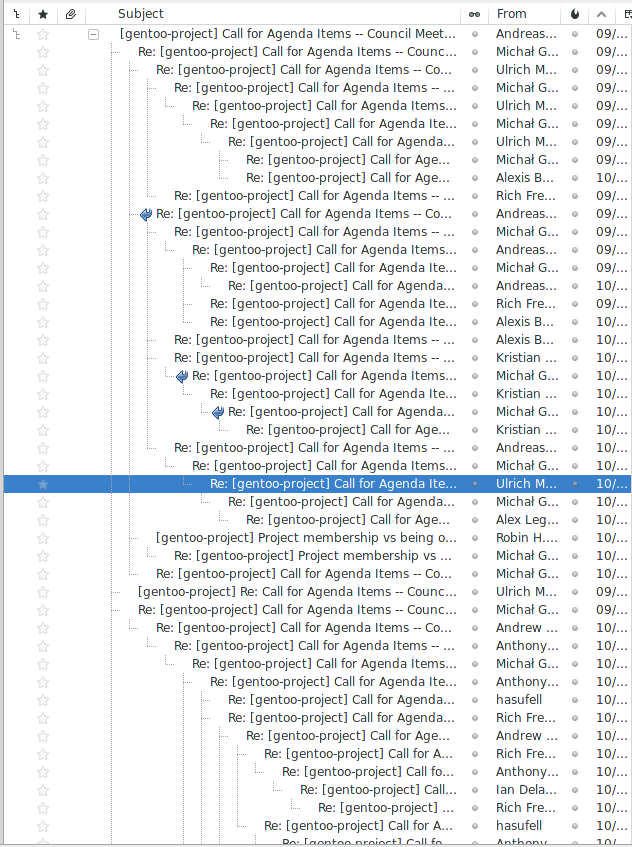Most of us use email rather frequently, however how email is used varies substantially across groups of people. The differences are especially noticeable when it comes to etiquette of quotation and threading of email, that in particular becomes important as the volume of information increase in order to keep track of the various threads.
Some groups are inherently better than others, and some email clients encourage better practices than others, but in the end it all comes down to the user choices being made. Not surprisingly, developers tend to have a better grasp at email etiquette, but what can we learn from this?
HTML emails:
Lets start off with HTML emails. I mean, seriously, disable this at once. Email should be text only, and if that isn't sufficient it likely should be an external reference or an attachment. HTML emails doesn't provide any obvious advantage over text email, but has many downsides, in particular external loading of resources leading to privacy issues and possibility to execute script files leading to security vulnerabilities. Having HTML, in particular in combination with scripting, or allowing external resource loading is as such only negative, not to mention you can't really work and compose a response offline.
If using HTML for the purpose of text formatting there exists common practices for styling plain text emails that removes most of the need for it. The following are a few of the tricks for bold, underlined and italic text that will have effect in sane email clients.
- *bold text* , the asterisk will be treated to indicate bold
- _underlined text_ , the underscore character on both sides of the text will be used throught the client
- /italic text/ , slashes are useful too

Proper quotation
So, once you start writing proper emails in plain text only, the question of quotation comes to mind. Do you ever top-post? if so, why would you do such a silly thing? Wikipedia has some more information on this quoting style, but I prefer to keep to the basic:
A: Because it messes up the order in which people normally read text.
Q: Why is top-posting such a bad thing?
A: Top-posting.
Q: What is the most annoying thing in e-mail?
Reading in the opposite order does something funky with your brain, doesn't it? Why do you want your readers to suffer like that in order to try to get a context of a conversation, in particular if this is one of 100 different threads they are actually following?
Continuing form that; quotes should be properly nested using the ">" character. That is how it has been done for several decades, and newcomers to email not following the practice are just an annoyance. Proper email clients will interpret this and display it accordingly:

On that same note, remove information that isn't relevant when responding to an email, reading through non-related information just increases the workload of everyone of your recipient, so just... don't, the few seconds more it takes you to clear out the information that isn't related results in a N times amplification of savings for the readers depending on the number of people involved (and the times the email is accessed).
Threading
Etiquette also comes into mind with regards to threading. In some mailing lists this becomes vital in order to follow the discussion, and if someone is using an email client (such as Google's Android standard email client that doesn't support In-Reply-To and References). A user that posts a message that breaks the thread can reasonable expect to be cursed upon and told to get a proper email client.

A sub-topic of proper threading is, if you during the course of the discussion create a sub-thread that actually focus on something different from the initial one, for crying out loud, change the subject of the email to reflect this to make it easier to keep track of and look back in the archives.
OpenPGP signature and encryption
I've likely said enough about this topic already, but any post about emails are required to cover the need for proper authentication, integrity and confidentiality of information. So if you don't use OpenPGP / GnuPG / PGP to protect your information (and going forwards, hopefully with a Memory Hole compliant client). Well, don't expect too much positive response from me at least.
